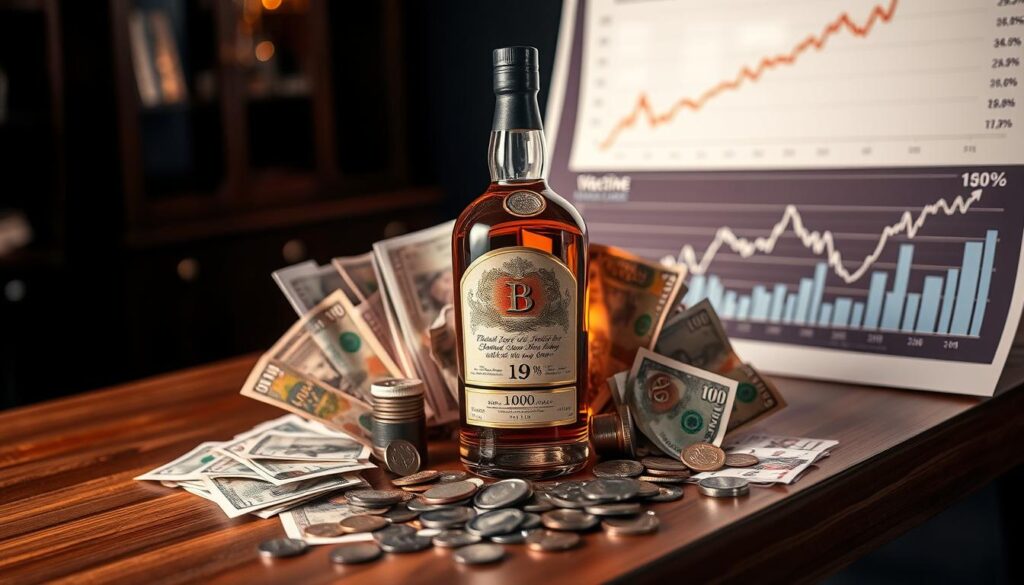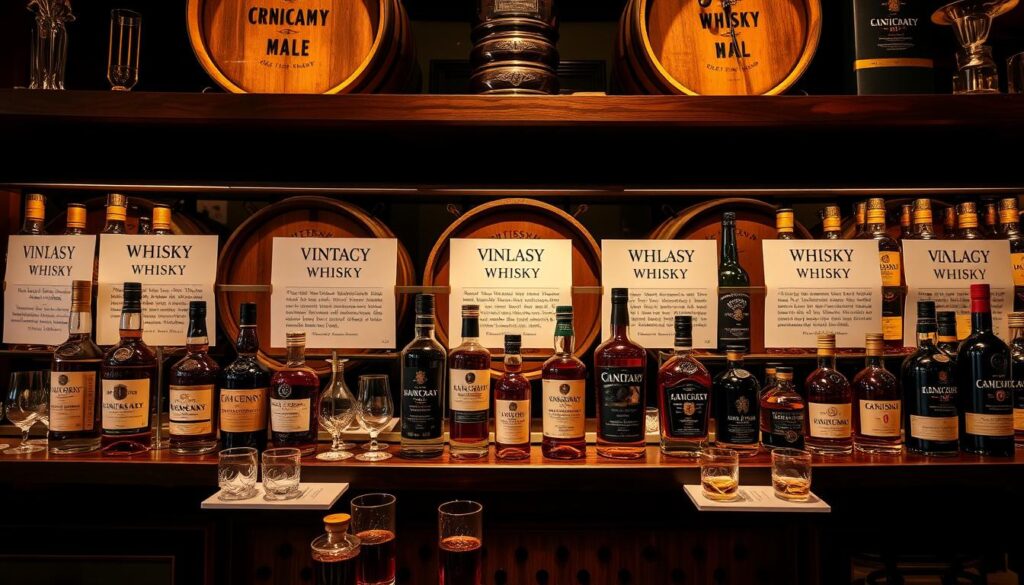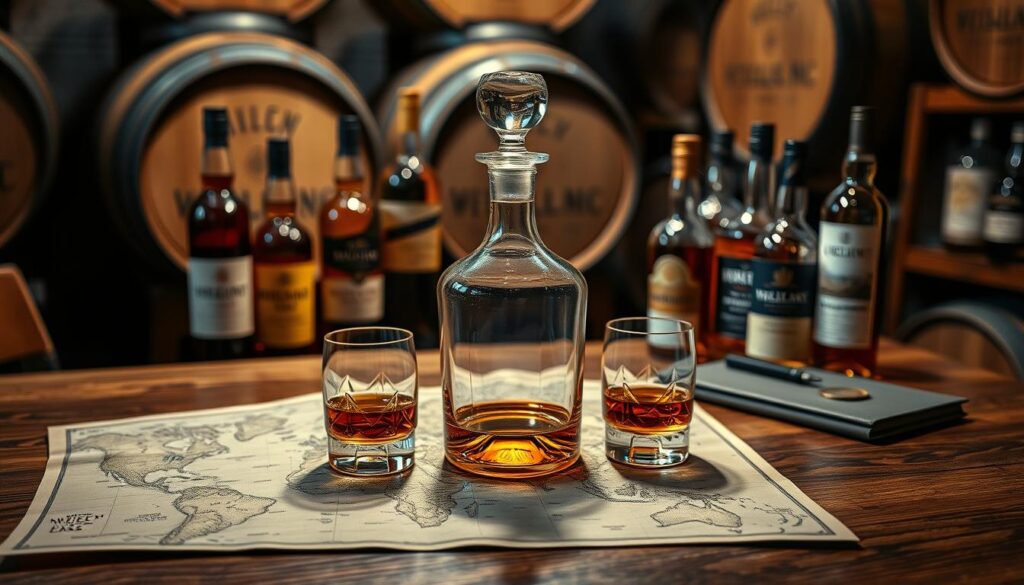The whisky investment market is surging. Rare whiskies have increased in value by 582% over the past decade, outperforming cars, watches, and fine wines. In November 2023, a 1926 Rare Macallan sold for $2.7 million, highlighting the growing demand for premium spirits.
Whisky, fueled by rising incomes in Asia, Europe, and America, is attracting collectors and serious investors alike. The limited supply of rare bottles further drives demand.
Premium single malts, like the Black Bowmore Aston Martin DB5 1964, have seen extraordinary returns. The bottle has risen from under £100 in 1993 to £50,000 today.
Curious about the risks, rewards, and how to start? Keep reading to uncover the full picture of whisky as an investment.
Understanding the Whisky Investment Market
The whisky investment market is growing fast, with bottles becoming a top choice for investors. It reached its peak in early 2022, showing it can thrive even when the economy is shaky. Over the last ten years, investors have seen their whisky portfolios grow by 407.8%, beating many other investments.
Global demand is fueling this growth, especially in Asia. Scotch whisky is leading the way, with 44 bottles shipped every second to 180 countries. The industry brings in £4.9 billion each year, making up 70% of Scotland’s food and drink sales. Big names like Diageo and Pernod-Richard are at the forefront, with huge turnovers.
Investors can choose from short-term (5 years) or long-term (10+ years) options. The market for rare bottles is strong, thanks to big investments. Edrington’s £500 million and Pernod-Richard’s €400 million show the sector’s future is bright. With the global malt whisky market set to grow 4.7% annually over the next decade, investors see whisky as a great investment.

The Growing Value of Whisky Casks
The whisky investment scene is growing fast. A 1988 Macallan cask, bought for £5,000, sold for £1 million at auction. This shows how much whisky’s value can increase.
Scottish cask whisky is a solid investment, with returns of 8% to 12% a year. Rare and limited editions are key. This strategy has worked well, thanks to the growing love for unique whisky worldwide, including in Australia.
The Rare Whisky Icon 100 index has seen a 400% value jump from 2013 to June 2022. Prices for casks start at £2,500 to £5,000. The market is strong, with 44 bottles of Scotch whisky sold every second to 180 countries.
Recently, an Asian collector bought a rare 1975 Ardbeg cask for £16 million, setting a record. These stories show whisky’s strength as an investment, especially for those looking to hold onto it for ten years or more.
Types of Whisky Investments
The whisky investment market offers a range of opportunities for both new and experienced investors. Here are the three main types of whisky investments:
1. Single Bottles
Investing in single bottles involves purchasing individual whiskies expected to appreciate over time. For instance, the 2016 Macallan 18-Year Old increased in price from $463 to $1,209 between 2020 and 2022.
These investments are accessible, with prices ranging from affordable to premium, allowing investors to start small.
However, significant growth often takes years, and value depends on factors like rarity, condition, and brand reputation.
2. Cask Ownership
Cask investment entails purchasing entire whisky casks, usually directly from distilleries, and holding them as they mature. Starting around $1,000, casks often offer higher returns than single bottles due to the value added by aging.
The global whisky market, valued at $69.8 billion in 2021, will grow to $86.1 billion by 2025, reflecting cask whisky’s strong potential.
However, this long-term investment typically requires holding periods of 10 years or more for optimal returns.
3. Collections
Building a whisky collection involves curating bottles around themes like distilleries, types, or limited editions. Single malt Scotch is a popular choice, but Japanese whisky is also gaining traction.
Collections focused on rare or limited-edition bottles benefit from growing demand, especially in markets like China.
Experts recommend holding collections for 3-5 years to allow time for value appreciation. Well-curated collections often see significant returns.

Most Valuable Whisky Categories
The world of whisky investing is full of great chances for those looking to collect valuable spirits. Recent market analysis shows that bottles from top distilleries are growing in value. The Rare Whisky Apex 1000 Index saw a huge 416% increase from 2012 to 2022.
Scotch single malts are at the top of the premium list. The Macallan 1926 60-Year-Old, with its special label, sold for $2.7 million in 2023. This sale set a new record for vintage whisky value.
Japanese whiskies are also doing well in the market. The Japanese Whisky Index went up by 11.75% in 2022. Brands like Hibiki are still highly valued. The growing interest in Indian single malts adds variety to investment options.
Scotland’s whisky regions have different growth rates. Speyside whiskies lead with an index of 282.92. Highland whiskies are next at 252.04. Campbeltown whiskies are also growing fast, with an index of 315.50. These numbers show the wide range of opportunities in whisky investing.
Factors Affecting Whisky Value
Several key factors influence the value of whisky. Age is a major factor, with top bottles aging between 12 and 25 years. Rare whiskies aged longer, like the 1926 Rare Macallan, which sold for $2.7 million in 2023, fetch high prices.
The reputation of the distillery also matters a lot. Scotland has nearly 200 active distilleries, with Macallan, Bowmore, and Glenfiddich being the most sought-after. The type of cask used can change the whisky’s taste, with sherry casks often being more valuable.Market demand is another big factor. The growing middle class in Asia, especially China, has pushed up whisky prices. Over the last decade, rare whisky values have soared by 582%. Keeping the whisky in a cool, dry place is key to preserving its value.

How To Start Investing in Whisky
Starting your whisky investment journey needs careful planning. A good whisky investment strategy starts with market research. The Knight Frank Luxury Investment Index shows a 586% price growth for select single malt bottles in the last decade. This growth shows the potential for big returns in a well-planned whisky investment portfolio.
First, set a realistic budget. Expert investors suggest not to spend more than 10% of your total investment funds on whisky. You can start your whisky investment portfolio with as little as $1,000. However, cask investments might need more money.
Make connections with trusted dealers, distilleries, and auction houses. Learn more by attending whisky tastings, drinks fairs, and special events. These events are great for meeting experienced investors and finding potential investment bottles.
When planning your whisky investment strategy, focus on diversification. Mix different brands, ages, and styles in your portfolio. Consider both bottles and casks, remembering cask investments have tax benefits but cost more for storage. Keep up with market trends, new product releases, and distillery performance to make smart investment choices.
Storage and Maintenance Requirements
Proper storage plays a crucial role in preserving the value of whisky investments. Professional facilities maintain ideal conditions by keeping temperatures between 55-65°F (13-18°C), controlling humidity, and ensuring secure, dark environments. Specialized storage services typically charge around £40 per year per cask and attract top American and Scotch whisky producers.
Scotch whisky requires storage in HMRC-bonded warehouses in Scotland. These facilities ensure compliance with regulations, provide biannual market updates, and manage essential documentation, including ownership certificates and insurance.
Investors must prioritize insurance to protect their whisky against theft, damage, or disasters. Regularly inspecting bottles prevents issues like damaged corks or labels, keeping the whisky in excellent condition. By maintaining proper storage, investors can significantly increase the value of vintage bottles, making whisky a smart long-term investment.
Legal and Tax Implications
Knowing about tax implications is key in whisky investment. In the UK, whisky cask investment has special tax benefits. Since cask whisky qualifies as a wasting asset, authorities do not tax it on capital gains. This is because it loses spirit due to evaporation, known as the ‘Angels’ Share,’ at a rate of 0.5-1.5% each year.
On the other hand, bottled whisky has different tax rules. If sold for over £6,000, authorities tax it on capital gains. The tax rate ranges from 10% to 20%, depending on your income. For those looking into English whisky flavors and investments, knowing these tax rules is vital for planning.
Where you store your whisky casks also affects taxes. Storing them in bonded warehouses delays tax until the sale. This is great for investors from Asia, who can use their home country’s tax rates to their advantage. It’s wise to talk to tax experts to understand the rules in different places.
Maintaining accurate records is equally important. Detailed documentation proves ownership and ensures compliance with tax laws. Depending on their location and regulations, many investors use company accounts to optimize tax strategies.
Whisky Investment: A Golden Opportunity
Whisky investment has shown impressive returns, with rare bottles like the Macallan Valerio Adami 60-Year-Old selling for $2.7 million in 2023. Since 2013, whisky has outpaced the S&P 500, growing 280% compared to the index’s 158%. The global whisky market is expanding, driven by key markets like the USA, France, Singapore, and India.
To succeed, whisky investment requires careful planning, especially for portfolios valued over $1 million. Cask investments offer benefits like aging value and tax advantages. A diversified portfolio, attention to authenticity, and building partnerships with trusted sources are essential for long-term success.
Whisky isn’t just a drink—it’s a golden opportunity for savvy investors. Now that you’ve uncovered its potential, why stop here? Dive deeper into the world of whisky investments. Explore rare bottles, casks, or industry insights to turn your passion into profit. Your next great investment might just be a dram away. Start your journey today!